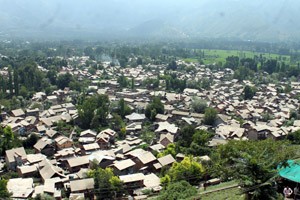Adil Lateef

Srinagar, Aug 2: Pollution caused by Cement factories in Khrew area of South Kashmir is adversely affecting wild life, saffron production, human lives as well as livestock, locals and experts said here.
Locals in Khrew area of district Pulwama are up in arms against the pollution caused by the Cement factories located in area and its adjoining villages as these factories violate pollution control norms.
The first cement factory in Khrew area was established in 1984 by Kashmir Cement Project (KCP) and local youths were employed in it. Abdul Majeed, a social activist, told Excelsior that till 2004, there was lone factory in the area but afterwards, more factories were established in the area. A senior Government official said that there are 7 cement factories operational in the Khrew area.
Khrew, 23 kilometers from Srinagar, is a picturesque hamlet surrounded by mountains and woods. The hamlet also produces world famous saffron and has agricultural land as well. The woods of Khrew, which are connected to Dachigam wild life sanctuary, were once used to be home for many wild animals including Hangul. However, the presence of cement factories and the pollution caused by them have triggered exodus of wild animals.
“Khrew area was once producing walnuts and almonds in huge quantity. But, the cement factories have ruined everything. Our saffron and agricultural production has been hit hard. There is no wild life in our area anymore because of blasting, which rattles whole area,” Majeed said. Not only cement factories, but hundreds of trucks are also cause of trouble for the locals. “The whole area remains draped in dust because of these trucks,” he said.
The locals said that the worst affected villages of Khrew include Pakhribal, Nagadore and Botthen. “The lives of people living in these villages have been turned into hell,” they said.
The locals of Khrew demand that the cement factories should be monitored by the Government and they should be asked to strictly follow pollution control norms.
Officials admitted that the cement factories in Khrew have ruined environment and wild life. They also said that the pollution has adversely affected saffron production, human lives and livestock. Blaming lack of monitoring by Pollution Control Board, the officials said that the fault lies on the side of Government as well cement factories.
“There is, indeed, fault on our side as well. We all know that the cement factories violate norms but the concerned department also preferred ignorance,” they said, adding: “there are lapses”.
Environmental Science expert, Prof. Ghulam Ahmad Bhat, who has studied effects of cement factories in Khrew on the human lives, flora and fauna, and wild life, said their presence is harmful in the short as well as long run.
“If we talk about saffron, we have found that the mercury element has already affected its production. It has affected its corn, bulb and leaves. The mercury also affects land,” Bhat told Excelsior.
Referring to wild life, Bhat said that after conducting research few years, they found that the dust coming out of cement factories has not only affected Khrew woods but it has also reached Harwan. “And, due to its affect, the animals are running away from Khrew. Few years ago, Hangul used to be there but now he has found safe refuge in Aru sanctuary of Pahalgam,” the Professor said.
Bhat said that they found the dust and air pollution caused by cement factories is also affecting health of human lives. “As compared to other areas of the Valley, there are more respiratory problems among locals in Khrew,” he said.
Deputy Commissioner Pulwama, Neeraj Kumar, told Excelsior that the pollution caused by cement factories have “indeed affected” environment in Khrew. “Our saffron, agriculture, wildlife has been affected,” he said.
The DC said that he along with civil society Khrew, Auqaf Committee and cement owners held a meet with Divisional Commissioner Kashmir in Srinagar over the issue of pollution and monitoring.
“We want permanent solution to these problems. So, we decided that within one month, we will chalk out a plan how to implement various proposals. We will also talk to wildlife and forest departments,” he said.
“I am personally for pollution free environment… Without ecological balance, sustainable development is not possible,” the DC added.

